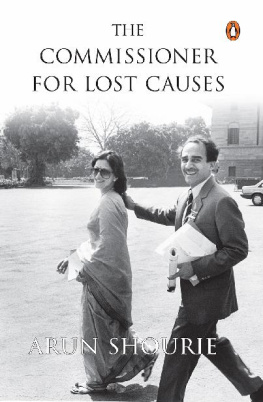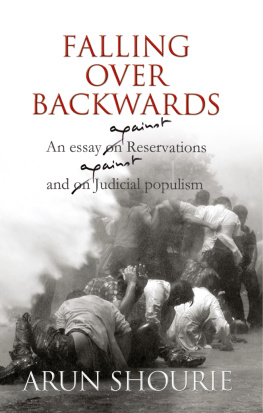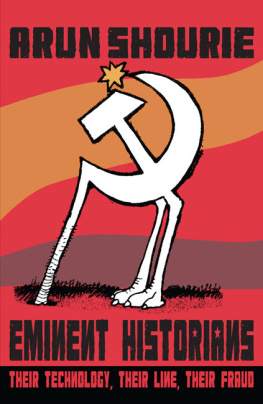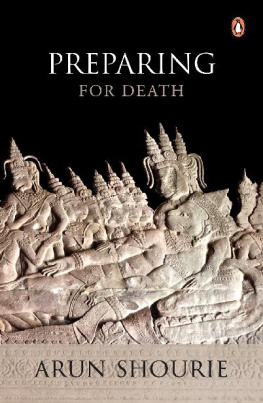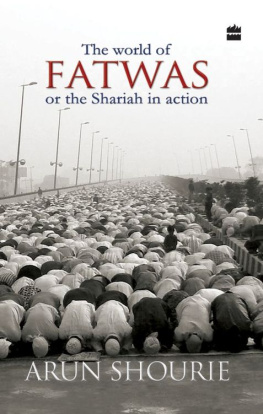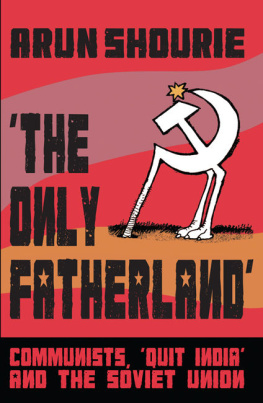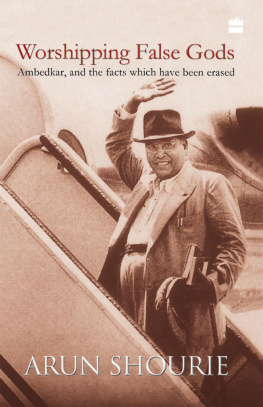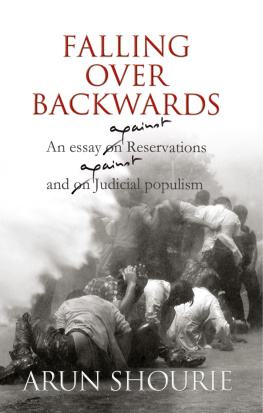ARUN SHOURIE
The Commissioner For Lost Causes
Contents
For
Anita
Our very life
From
Adit and me
This book
Main tumhaarey office ke baahar ek Board lagaaungaa, The Commissioner for Lost Causes.
Ramnathji He was, therefore, especially pleased with the series. Together with the work of a public-spirited lawyer, it had occasioned hearing after hearing in the Supreme Court, which led to it giving a series of far-reaching orders.
This particular pursuit was certainly not a lost cause, and, what with his contacts in high legal circles, he knew it better than most of us. The orders of the Supreme Court led to the release of thousands of persons who had been rotting in jails for years and yearsnot because they had been convicted of any crime but because their cases had not come up. By one estimate, 40,000 prisoners had been released, 27,000 in Bihar alone.
Yet, taken as a whole, the work my colleagues and I did could certainly be seen as the pursuit of lost causes. We exposed corruption. It is hundreds and hundreds of times larger today. We nailed malfeasance. Standards have fallen so low that the departures from the norm that used to shock everyone those days are not even noticed today. We railed against the misuse of an institution. Today, all institutions are instruments, and are accepted as such. We nailed the lies of a Minister, of a Prime Minister. Today, that the ruler has heaped yet another truckload of falsehoods on our heads is just what we expect. We fought against misrepresentation of one observation in one report by a rival newspaper. Today, fake news is an entire genre. We bemoaned the fall in the quality of persons in public life. Today, one is astonished to come across quality in any institution of State.
So, lost causes? Yes. But I am scarcely their only Commissioner.
As you go through writings of that time, dear reader, you will find many precursors to what sends us screaming today. The twists and turns of Judges, for instance. The lies and perfidy
of rulers, for another. The attempts to throttle the media, for yet another.
But the fact that what is happening today was also happening then is no excuse. For one thing, scale and acceptance themselves matter. Murder has been going on forever. That does not explain away organized slaughter, it does not explain away either serial encounters, or sanctioned and sponsored lynchings. I, therefore, sincerely hope that incidents set out here will not fuel Whataboutery. Kam-bhakts tempted to put this volume to use that way would find it prudent to wait for the next one!
There are lessons from those years, of course. The first, that an individual, even a JP, cannot save us. Nor can even a Brahmaputra-scale movement. After all, we have had so many of thesein time: the Freedom Movement, JPs and the students movement, the movement led by the All Assam Students Union (AASU); and across our geography: from Chipko in the Himalayas to the exemplary reform movements of Kerala. Indeed, such occasional bursts can leave a residue of hopelessness. When the next great leader comes along, when the next movement gathers traction, people fall back in cynicism: Nothing came even of Gandhi, nothing came even of JPs movement. Why should this upsurge be different? Only the proper functioning of institutions, day in and day out, their proper functioning without let, can pull us out of the ditch. That requires that the right sort be placed in them. And then that everyone in every institution lives up to high standards, that she and he live by lofty values. But even the best will slacken unless they are monitored, unless they are rewarded for standing up for what is right and severely punished when they transgress. And so anyone who does wrong, howsoever high or well connected he may be, must be dealt with swiftly and decisively. Everyone who does right, howsoever low on the rung he may be and howsoever isolated, must be shielded by all as if by a fortress. The 2000-year-old The Book of Three Strategies describes a country disintegrating in disorder, and thus ripening to be undermined, ripening for an outright assault:
When officials cluster in cliques, each promoting their friends, nominating crooks for appointments, suppressing and thwarting the good and intelligent, turning their backs on the public for the sake of their own private interests... When powerful clans gather crafty villains... [When] the country is in an uproar but the government ministers do not report it... The Military Pronouncements states, When the good are recognised as good but not promoted, the evil recognised as evil but are not dismissed, the wise are obscured while the corrupt are in office.... The Military Pronouncements states, When deceitful ministers hold superior positions... [When] they rely on their awesomeness to grant personal favors, and act in a manner that offends the masses. [When] advancement and dismissal lack any basis, the evil are not dismissed, and men seek gain with any appearance possible. [When] they slander and vilify those of great Virtue, and make false accusations against the meritorious... [When] they gather and detain affairs of government so that commands and orders are not put into effect... When the ruler employs such wanton characters, he will certainly suffer disaster and calamity...
A proximate description of those days? A precise description
of these?
The lesson of those years is that values collapse, that institutions disintegrate with the rush of an avalanche: after all, episodes that figure here occurred just thirtyforty years ago. They show how one wrong by a ruler makes it that much easier for him to wreak the next one, just as one lie strengthens a habit, and thus makes it that much easier for him to utter the next one. Indeed, it makes the next perfidy necessary, just as that one lie makes a landslide of them unavoidable. The episodes show how malfeasance in one institution does not just facilitate, it makes inevitable, malfeasance in all.
So, the time to arrest decay, to check the ruler, is yesterday. Disintegration, too, has no hindlocks. The place to do so is anywhere and everywhere.
But it is never enough to set rulers and institutions right once or twice, howsoever completely and drastically this may be done. They have to be set right one by one, they have to be set right again and again, and we have to go on doing so forever. Therefore, reformers, their very lives, teach us, Begin, yes, but also persevere.
Now for some neti, neti.
This book is not by any means a history of those times. It is just about the episodes it sets out.
Various persons appear in it. But it does not draw a well-rounded portrait even of the ones who appear frequently in it. We glimpse only those facets of their ways which the particular episode revealed.
The book is not an account even of my work. Episodes that led me to write books have been left out altogether: the evil that organized religions wreaked; their use in politics; the evil of caste; terrorism; national security; the debasement of discourse; economic reforms; and many others.
The book is an account of some of the work that my colleagues and I did at the Indian Express. The popes of the time frowned on much of it. Others cheered it on as the new journalism.
At places, I have reported conversations and remarks. How does he remember them? some will ask. Some of them I had included in articles that I wrote at the time, and so there was no difficulty with regard to them. In several articles, I had included clues that would remind me of what was happening and being said at the time. Third, where I could check with either the person concerned, or, where the person himself had passed away, with someone close to him, I have done so. For instance, Giani Zail Singh was killed some years ago in a most unfortunate accident; and so I checked the instances and remarks with the one person who was closest to him, my friend Tarlochan Singh.



